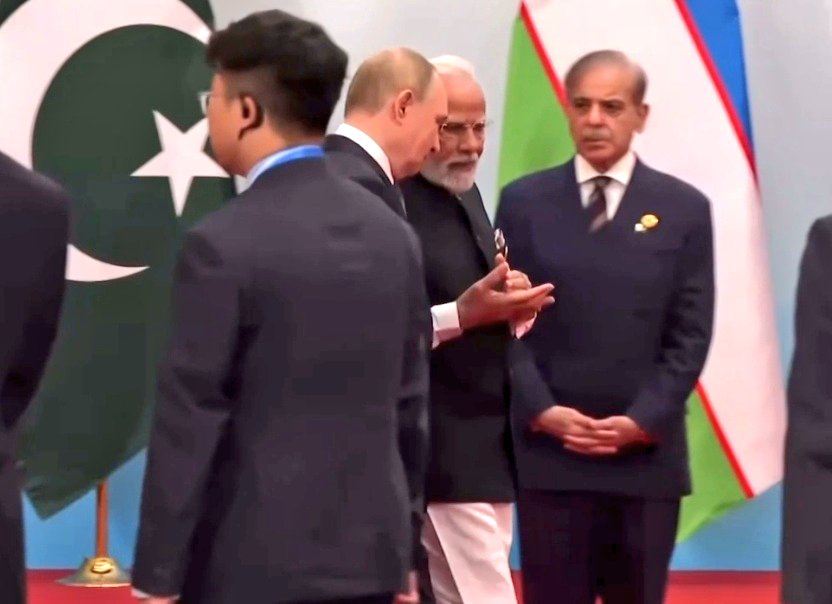Modi Condemns Terror Double Standards at SCO, Cites Pahalgam Attack as Global Alarm
Indian Prime Minister Narendra Modi delivered a forceful message on terrorism at the 25th SCO Summit in Tianjin on Monday, warning against what he called unacceptable global double standards in dealing with terror.
Citing India’s long-standing exposure to cross-border violence and referring directly to the recent attack in Pahalgam, the Prime Minister said terrorism was no longer a local threat, but a shared crisis of conscience for the international community.
 |
| Image Source: PM NaMo video screengrab |
While not naming Pakistan directly, the Prime Minister challenged the permissiveness with which some states continue to support terrorist networks, asking whether such conduct can ever be accepted in a rules-based international order.
He stated that no society or citizen can consider themselves insulated from terrorism’s reach and stressed that coordinated, uncompromising action was the only way forward.
“Terrorism is not a threat to individual nations--it is a challenge to all of humanity,” he said, adding that India had long borne the cost of global inaction and duplicity on the issue.
Modi positioned India’s current role in SCO counterterror operations as both proactive and operationally committed.
He referenced India’s leadership of a Joint Information Operation under the SCO-RATS mechanism, aimed at dismantling Al-Qaeda-linked entities, and called for expanded cooperation to counter radicalisation and block terror financing at its source.
He welcomed the support of SCO members in these efforts and urged the bloc to speak with one voice when confronting terror in all its forms and justifications.
While terrorism remained the core thrust of his address, Modi also reiterated India’s view that infrastructure and connectivity projects in the region must be aligned with the principles of sovereignty and territorial integrity.
Without naming China’s Belt and Road Initiative, he warned that connectivity that bypasses consent erodes trust and legitimacy.
Citing India’s work on the Chabahar Port and the International North-South Transport Corridor, he said regional integration must build trust rather than bypass it.
Modi also proposed deeper civilisational engagement within the SCO through a new platform dedicated to shared cultural and intellectual traditions.
He described India’s motto of “Reform, Perform, Transform” as a model for post-crisis development and called for the SCO to play a leading role in global governance reform, particularly at the United Nations, which turns 80 this year.
India’s focus on terror and sovereignty came with an invitation to recalibrate multilateralism. Modi concluded by supporting the SCO’s evolving agenda on drug trafficking, cybercrime, and transnational threats, and extended his best wishes to Kyrgyzstan as it assumes the next SCO chairmanship.
Multipolar Optics: Putin, Xi, and Modi in Tianjin
The SCO plenary also underscored a broader geopolitical message. Russian President Vladimir Putin used his remarks to brief leaders on his recent meeting with U.S. President Donald Trump in Alaska, calling it an opening for peace in Ukraine.
He reiterated Moscow’s position that the crisis stemmed not from an “invasion” but from a “coup d’état in Kyiv supported by Western allies,” and insisted that attempts to pull Ukraine into NATO had been a root cause of the conflict.
“UN principles, including respect for sovereignty, are still valid and unshakable today,” Putin said, while appreciating the roles of China and India in seeking stability.
Chinese President Xi Jinping, for his part, warned against “Cold War mentality, camp confrontation and bullying behaviour.”
He invoked the “Shanghai Spirit” of mutual trust and equality, noting that the SCO had been the first regional bloc to conduct joint counterterrorism actions and build border confidence-building mechanisms.
The optics of Modi, Putin, and Xi sharing the stage highlighted how India, Russia and China are positioning themselves as anchors of a multipolar order amid Washington’s tariff diplomacy.
The United States has imposed sweeping 50% duties on Indian exports in retaliation for New Delhi’s oil trade with Russia, while threatening Beijing with similar penalties.
India’s Balancing Act and Global South Push
The Tianjin summit is the latest chapter in India’s balancing diplomacy. Modi’s bilateral with Xi the previous day signalled a thaw in ties, with both leaders stressing peace along the border, reopening Kailash Mansarovar travel, and resuming direct flights.
Modi told Xi that the welfare of 2.8 billion people was tied to India–China stability, while India’s Foreign Secretary Vikram Misri said the two sides agreed differences must not become disputes.
The Modi–Putin meeting, expected after the plenary, is being watched closely as India and Russia prepare for President Putin’s state visit to India later this year.
Both sides have already signalled intent to address trade imbalances, strengthen defence and energy cooperation, and expand financial systems resistant to U.S. secondary sanctions.
The SCO gathering also gave Modi space to engage other leaders of Central Asia, West Asia and beyond -- from Kazakhstan, Uzbekistan and Kyrgyzstan to Egypt, Armenia and Vietnam -- signalling India’s intent to deepen Global South solidarity.
Russia’s envoy in Vienna, Mikhail Ulyanov, described the emerging Russia–India–China understanding as part of a “qualitatively new system of international relations” and an erosion of post-Cold War U.S. dominance.
By combining a firm stand on terrorism with calls for sovereignty-based connectivity and multilateral reform, Modi’s speech in Tianjin aligned with the themes articulated by Putin and Xi. Together, the interventions reflected a larger push by the SCO -- and by the Global South more broadly -- to frame multipolarity as the emerging structure of global affairs.
